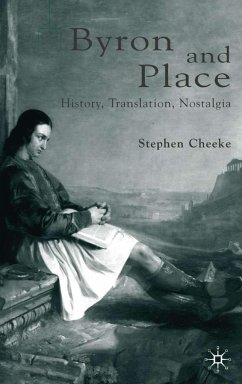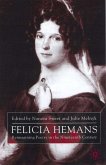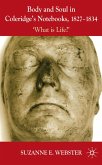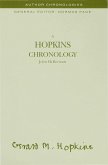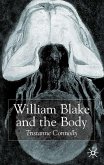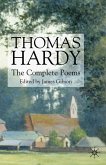This new study of Byron explores the 'geo-historical' - places where historically significant events have occurred. Cheeke examines the ways in which the notion of being there becomes the central claim and shaping force in Byron's poetry up to 1818. He goes on to explore the concept of being in-between which characterises Byron's 1818-21 poetry. Finally, Byron's complex nostalgia for England, his sense of having been there , is read in relation to a broader critique of memory, home-sickness and place-attachment.
Hinweis: Dieser Artikel kann nur an eine deutsche Lieferadresse ausgeliefert werden.
Hinweis: Dieser Artikel kann nur an eine deutsche Lieferadresse ausgeliefert werden.
'Stephen Cheeke's Byron and Place: History, Translation, Nostalgia is an important contribution to the study of Byron and of the place of 'place' in the culture of the romantic period. Erudite and clear, the book helps us to chart Byron's evolving relation to place, to locale, and particularly to historical rather than natural sites. While we have had good studies of Byron and history and of romantic places in relation to nature and consciousness, Cheeke reveals Byron engaging thoroughly historicized places.' - Jeffrey N. Cox, Professor, Comparative Literature and Humanities and English, University of Colorado
'This study of the authority and authenticity that Byron discovered at various 'geo-historical sites' is both rigorous and thought provoking. It excels at describing the overall shapes of poems as well as displaying precise close reading-skills. It is theoretically well informed but also prepared to improvise close-fitting intellectual frameworks. Cheeke describes in fresh terms an overall literary career and in so doing has made a significant contribution to Byron Studies.' - Tony Howe, New Hall, Cambridge, Romanticism
'This study of the authority and authenticity that Byron discovered at various 'geo-historical sites' is both rigorous and thought provoking. It excels at describing the overall shapes of poems as well as displaying precise close reading-skills. It is theoretically well informed but also prepared to improvise close-fitting intellectual frameworks. Cheeke describes in fresh terms an overall literary career and in so doing has made a significant contribution to Byron Studies.' - Tony Howe, New Hall, Cambridge, Romanticism

